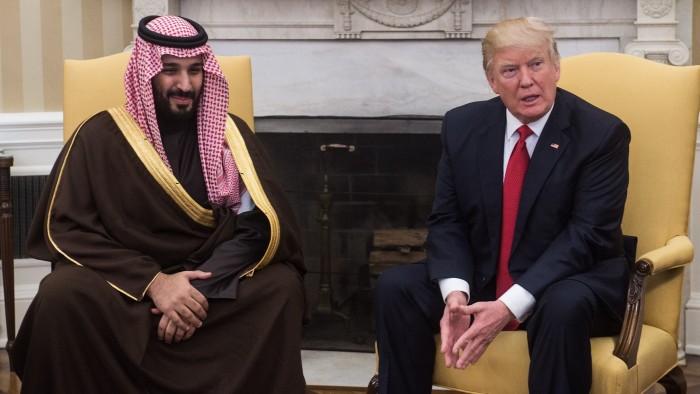Unlock the White House Watch newsletter for free
Your guide to what Trump’s second term means for Washington, business and the world
The writer is director of regional security at the International Institute for Strategic Studies
In a reprise of his visit to Saudi Arabia in May 2017, Donald Trump’s trip to the Gulf this month includes the United Arab Emirates, Saudi and Qatar. The pomp and theatrics may even exceed the previous one — his hosts know that satisfying Trump’s craving for ceremony and big announcements will help pave the way for the deals they seek. But both context and substance differ significantly this time around.
Trump will land in a changed peninsula. Saudi Arabia has matured geopolitically and Riyadh is now the place to be for leaders, captains of industry and other players. The UAE is a global hub for finance, technology, trade and billionaires. Qatar is no longer the regional bête noire, having made itself a valued diplomatic player for Islamist connections that rile up but also make deals happen.
These countries feel vindicated and ready to navigate global turbulence. In their view, the eroding order was too western and inflexible. They can now claim a seat at the table on global economic and security governance. They are no longer merely in the business of strategic hedging; instead, they seek to bridge economic and political divides, positioning themselves as facilitators and investors for larger powers.
Having resisted western demands to align against Russia and China, they can now watch as that consensus cracks. They are facilitating US-Russian reconciliation and doubling down on Beijing as European states, bruised by Trump’s policies, rebuild ties with China.
Dealing with Trump will require cool heads. But Gulf leaders believe they can manage and benefit from his idiosyncratic style better than others. In the early days of his new administration, Saudi Arabia said it would invest $600bn in the US over four years. (Trump is expected to reciprocate with a $100bn arms deal offer.) In March, the UAE announced a plan to invest a whopping $1.4tn over the next decade. Whether these numbers materialise is less important than the fact that they got Trump’s attention.
The danger for the Gulf lies in conflating access with leverage and in overestimating the latter — a mistake could be costly. Breaking with China is not an option, regardless of US expectations. Limits are one thing, but as the biggest buyer of the Gulf’s oil and main economic partner, China is too important to their prosperity to be sidelined.
And for all their hostility to Iran, the Gulf states don’t want a war. They welcome Iran’s weakening but worry about Israeli cockiness. Like Trump, they would prefer a deal with Tehran but lack any idea of what he would settle for. A limited nuclear resolution that pleases him without constraining Iran could make things worse. Another concern lurks: that Israel will either sabotage diplomacy or steer Trump towards launching a large-scale attack on Iran, prompting retaliation against US targets and critical infrastructure in the Gulf.
The economic turbulence of the past few weeks has also hurt them. Despite US trade surpluses and Gulf investments, Trump slapped a 10 per cent tariff rate on them. Gulf sovereign wealth funds are heavily invested in US equities and Treasuries. Gulf investors who once valued the predictability of the US system are now having to rethink their exposure. A prolonged weakening of the dollar will affect Gulf currencies pegged to it, with inflationary effects.
As importantly, the oil price has fallen because of global expectations of recession and inflation. An oil price below $65, as currently, is bad news for fiscal space, transformation plans and regional stability, given that poor countries rely on Gulf largesse. More than that, the US (now the largest producer and a major exporter of oil) has weaponised energy in ways the Gulf states themselves have refrained from.
Trump may want to seal the deal Joe Biden could not: a US-Israel-Saudi agreement. Saudi leaders remain eager for a comprehensive agreement that includes US security guarantees and advanced technology. But while including Israel is important to securing Washington buy-in, its conduct in Gaza, rejection of a Palestinian state and pounding of Syria complicate matters. Saudi’s young leaders may have no emotional attachment to Palestine but the country’s youth do. Managing Trump’s insistence as Gaza bleeds and starves may well be the Saudi leadership’s trickiest task.
Perceptions of the US are also evolving. If Nato and Asian partners, tied to America by history, values and economics, now doubt its commitment, then Gulf leaders must also be wondering about the pitfalls of this relationship as much as its benefits.
